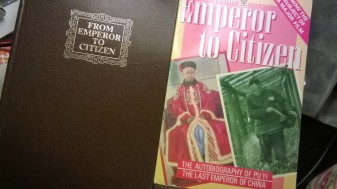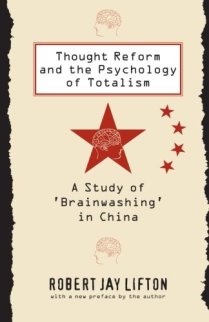Two Copies of From Emperor to Citizen: The Autobiography of Aisin-Gioro Pu Yi

(Right: Published by Oxford University Press,1987. Left: By Foreign Language Press, Beijing, China, 1989)
It is most important to get the edition that has W.J.F. Jenner’s introductions and S. Winchester’s Afterword (one in the right) rather than the editions by Foreign Language Press, Beijing (left), if one really wants to know what happened to Pu Yi, the last emperor of China, because those Beijing editions were published under tight control of the Communist Party Propaganda Department.
In the version of 1987 from Oxford University Press, Jenner, who in 1964 originally translated this “autobiography” of the Last Emperor entrusted by the Foreign Language Press, revealed such a great deal of truths behind the publication of this book.
His and his co-editor’s additional words have been omitted from the later editions by Foreign Language Press, as a matter of course.
Many left-wing scholars and journalists have advocated to us that, by the great “thought reform programme” and the “generosity policy” of the Chinese Communist Party, Pu Yi was “re-educated” perfectly and dramatically from an arrogant little tyrant in the Forbidden City to a decent able worker of acquired communism mind.
However, in fact, that is not true at all.
According to [the fourth wife of Pu Yi’s] published account, she found his mouthing of progressive cliches hard to take when he showed hardly any interest in how she had coped during the intervening ten years.” (She had not been informed his where-about until then.)
Even as late as 1961, two years after Pu Yi’s release from the prison, when she had finally got divorce Pu Yi and remarried and had a son, “there was still pressure on her to drop everything and start looking after Pu Yi again, as he was incapable of looking after himself. [……] Even his much-publicised labour in the Botanical Gardens outside Peking was something of a ritual.
” Pu Yi’s final marriage to the fifth wife, who was well-qualified and experienced nurse, was “arranged for him by the Chinese People’s Political Consultative Conference and the Communist Party’s United Front Department.”
Pu Yi Was Propaganda Puppet for the Communist Party of China
“By 1955,” Jenner writes, “the authorities had evidently decided that Pu Yi was by now useful for propaganda purposes. [……] Pu Yi’s presentation to foreigners as a living advertisement for the People’s Government and the Communist Party began in 1956, while he was still in prison; and after his release he was often required to meet foreign visitors to China.”
He survived the stormy Cultural Revolution not because he became a model citizen and a Communist Party member, but because of “Chou En-lai’s intervention, and [because] the local police kept Red Guards away.”
As for the “generosity policy” for which Pu Yi and the Japanese inmates expressed their gratefulness, again, it was a mere part of the “thought reform programme”.
Jenner writes; “The special consideration shown Pu Yi and other high-ranking Manchukuo (sic), Japanese, and Nationalist officials cannot be regarded as typical of Chinese prison conditions. These were all people of potential value in winning over others in future, and political considerations saved them from the harsh justice that many lesser figures received.”
According to Chu Ch’u and Hsu Tse, the ex-vice governor and the ex-warder of the Fushun War Criminal Camp, respectively, they actually protested to the prison authority that the treatment they were told to give to the Manchus and the Japanese was too generous.
The Order was to give them good foods in good amount and good care for their health. No abusive words and no tortures should be given to those “special prisoners”.
The authority explained; It was the policy of the Chairman Mao and the Premier Chou.
Mao and Chou ordered to transfer those Manchus and the randomly selected Japanese who had been kept in slave labour camps in Siberia to China in July 1950.
The initial order was from Stalin himself. The “Brain-Washing Programme” was designed in Russia first. They experimented with the PoWs in Siberia as well.
“To be honest,” Chu Ch’u says, “it was only when I heard of those Japanese inmates who were returned to Japan by “amnesty” and formed “the Association of Returnees from China (Chuugoku-Kikansha-Renraku-Kai in Japanese)” and have been confessing to the public their “crimes” for the anti-war campaign, I actually realised the true intention of the Premier Chou.”

“Thought Reform and the Psychology of Totalism: A Study of ‘Brainwashing’ in China” by Robert J. Lifton (pub.1961) reveals that “brainwash” treatment for other prisoners of other prison camps similar to Fushun who were not either Manchu or Japanese were severe. Physical and psychological tortures were used to force “self-education” “self-criticism”and “self-condemnation”.
However, it is not that there were no coercion towards those “special prisoners”.
Let us not forget that those Manchus and Japanese had been kept in unimaginably harsh condition of Siberian slave labour camps for good 5 years before they were transferred to China.
According to the above-mentioned ex-officers of Fushun Camp, the prisoners seemed to have lost their sound mental health already at that point of transportation to China in 1950.
After that until their deliberate release in late 50’s, while being not allowed to receive any visitors from outside, they were kept in silent but severe psychological coercion; homesickness.
The prison officers and inmate leaders of the “education group” kept telling them that only when they “recognise their horrible crimes and confess them in front of everybody to become a good person and good communist” they would be able to go home to see their beloved families and friends.
Many of members of the “Association of Returnees from China” admit that they did “confess” those barbaric crimes like “Rape of Nanking” and biological experiments of “Unit 731” and “Three All Policy” just because they wanted to come home.
They Did It in Their So-Called “Creative Activity”.
Their “confessions” were published after translated in Chinese and kept in the Social Science Institution in Beijing.
What Chinese scholars have been using as “historical material” when they research “Japanese Army’s atrocities in the Sino-Japanese war of 1937-1945” are those “confessions”.
Their works have been regarded as genuine scholarly researches by Western scholars. Now you can see where the fundamental problem lies.
